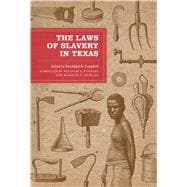
The Laws of Slavery in Texas: Historical Documents and Essays
by Campbell, Randolph B.; Pugsley, William S.; Duncan, Marilyn P.Buy New
Rent Textbook
Rent Digital
Downloadable: Lifetime Access
Used Textbook
We're Sorry
Sold Out
This item is being sold by an Individual Seller and will not ship from the Online Bookstore's warehouse. The Seller must confirm the order within two business days. If the Seller refuses to sell or fails to confirm within this time frame, then the order is cancelled.
Please be sure to read the Description offered by the Seller.
Summary
An electronic version of this book is available through VitalSource.
This book is viewable on PC, Mac, iPhone, iPad, iPod Touch, and most smartphones.
By purchasing, you will be able to view this book online, as well as download it, for the chosen number of days.
A downloadable version of this book is available through the eCampus Reader or compatible Adobe readers.
Applications are available on iOS, Android, PC, Mac, and Windows Mobile platforms.
Please view the compatibility matrix prior to purchase.
